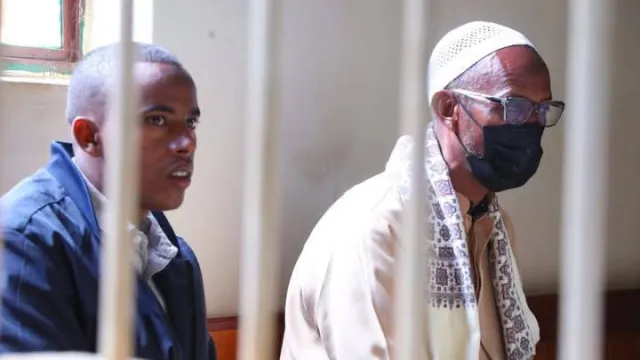Dusit D2 terror attack masterminds to serve 30 years in jail

Madrassa teacher Mohamed Abdi Ali, 61, and Hussein Mohamed Abdille Ali, 22, (left) set to serve 30 years in jail for their roles in the 2019 Dusit D2 terror attack in Nairobi.
The Kahawa Anti-Terror Court has handed a 30-year prison sentence to 61-year-old madrassa teacher Mohamed Abdi Ali for his role in the 2019 Dusit D2 terror attack in Nairobi.
The court also sentenced 22-year-old Hussein Mohamed Abdille Ali to a total of 30 years’ imprisonment—15 years for conspiracy to commit a terrorist act and another 15 for facilitating a terrorist act. Unlike his co-accused, Hussein's sentences will run consecutively.
The two men were found guilty of aiding the January 15, 2019, attack on the Dusit D2 Hotel Complex that left 21 people dead and scores injured. The complex, once a bustling business hub with over 2,500 daily visitors and full occupancy, saw foot traffic plummet to about 200 people per day in the aftermath, with occupancy dropping to 55 percent.
Delivering the sentence on Thursday, Lady Justice Diana Kavedza said the prosecution had proved its case beyond reasonable doubt. She noted that the ruling aimed to honour the memory of the lives lost, the dreams shattered, and the survivors whose lives have been forever altered.
“This judgment speaks not only for the victims but also for the survivors who continue to live with trauma, physical scars, and loss of livelihoods,” she said, describing the 2019 incident as one of the darkest moments in the country’s recent history.
The Office of the Director of Public Prosecutions (ODPP), led by Assistant Director Duncan Ondimu and supported by Principal Prosecution Counsels James Machira and Kennedy Amwayi, presented 45 witnesses during the trial. These included victim impact statements, painting a harrowing picture of lives disrupted.
One such statement came from Joseph Spindler, the father of US national Jason Spindler, who was killed in the attack. “I’m not here for revenge but for justice,” said Spindler, recalling his son as a visionary who had chosen Kenya as a place to work and build a better future. “Jason deserved a future, not a grave marked by the shrapnel from a terrorist’s suicide vest.”
Other testimonies highlighted the long-term medical and financial impact on survivors, including one individual who still has bullets lodged in his body and continues to struggle with steep medical bills.
The DPP urged the court to impose maximum and consecutive sentences to act as a deterrent and reinforce the resolve of Kenya’s justice system in tackling terrorism.
Lady Justice Kavedza concluded that the ruling not only holds the facilitators accountable but also sends a clear message: Kenya remains steadfast in bringing to justice not just the perpetrators of terror, but all who aid, finance, or facilitate such acts.
The sentencing marks one of the most significant milestones in Kenya’s counter-terrorism legal framework and offers a measure of closure for victims, survivors, and their families.





